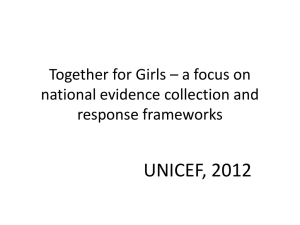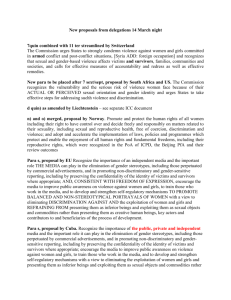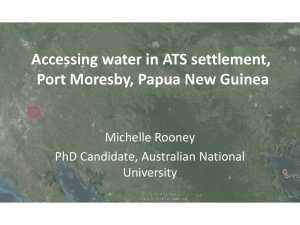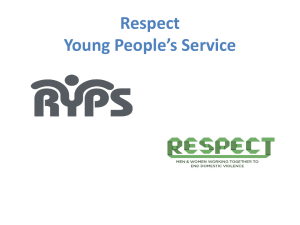English - Paper Smart
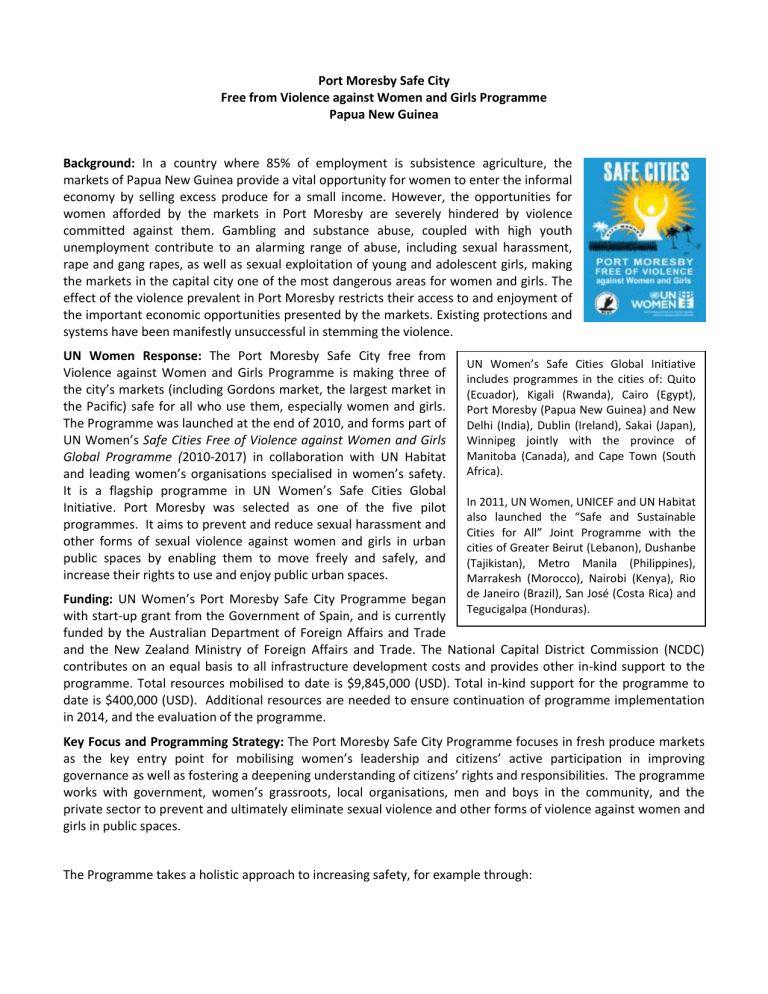
Port Moresby Safe City
Free from Violence against Women and Girls Programme
Papua New Guinea
Background: In a country where 85% of employment is subsistence agriculture, the markets of Papua New Guinea provide a vital opportunity for women to enter the informal economy by selling excess produce for a small income. However, the opportunities for women afforded by the markets in Port Moresby are severely hindered by violence committed against them. Gambling and substance abuse, coupled with high youth unemployment contribute to an alarming range of abuse, including sexual harassment, rape and gang rapes, as well as sexual exploitation of young and adolescent girls, making the markets in the capital city one of the most dangerous areas for women and girls. The effect of the violence prevalent in Port Moresby restricts their access to and enjoyment of the important economic opportunities presented by the markets. Existing protections and systems have been manifestly unsuccessful in stemming the violence.
UN Women Response: The Port Moresby Safe City free from
Violence against Women and Girls Programme is making three of the city’s markets (including Gordons market, the largest market in the Pacific) safe for all who use them, especially women and girls.
The Programme was launched at the end of 2010, and forms part of
UN Women’s Safe Cities Free of Violence against Women and Girls
Global Programme (2010-2017) in collaboration with UN Habitat and leading women’s organisations specialised in women’s safety.
It is a flagship programme in UN Women’s Safe Cities Global
Initiative. Port Moresby was selected as one of the five pilot programmes. It aims to prevent and reduce sexual harassment and other forms of sexual violence against women and girls in urban public spaces by enabling them to move freely and safely, and increase their rights to use and enjoy public urban spaces.
UN Women’s Safe Cities Global Initiative includes programmes in the cities of: Quito
(Ecuador), Kigali (Rwanda), Cairo (Egypt),
Port Moresby (Papua New Guinea) and New
Delhi (India), Dublin (Ireland), Sakai (Japan),
Winnipeg jointly with the province of
Manitoba (Canada), and Cape Town (South
Africa).
In 2011, UN Women, UNICEF and UN Habitat also launched the “Safe and Sustainable
Cities for All” Joint Programme with the cities of Greater Beirut (Lebanon), Dushanbe
(Tajikistan), Metro Manila (Philippines),
Marrakesh (Morocco), Nairobi (Kenya), Rio
Funding: UN Women’s Port Moresby Safe City Programme began with start-up grant from the Government of Spain, and is currently de Janeiro (Brazil), San José (Costa Rica) and
Tegucigalpa (Honduras). funded by the Australian Department of Foreign Affairs and Trade and the New Zealand Ministry of Foreign Affairs and Trade. The National Capital District Commission (NCDC) contributes on an equal basis to all infrastructure development costs and provides other in-kind support to the programme. Total resources mobilised to date is $9,845,000 (USD). Total in-kind support for the programme to date is $400,000 (USD). Additional resources are needed to ensure continuation of programme implementation in 2014, and the evaluation of the programme.
Key Focus and Programming Strategy: The Port Moresby Safe City Programme focuses in fresh produce markets as the key entry point for mobilising women’s leadership and citizens’ active participation in improving governance as well as fostering a deepening understanding of citizens’ rights and responsibilities. The programme works with government, women’s grassroots, local organisations, men and boys in the community, and the private sector to prevent and ultimately eliminate sexual violence and other forms of violence against women and girls in public spaces.
The Programme takes a holistic approach to increasing safety, for example through:
improvements to infrastructure and facilities ensuring a gender based approach, including running portable water;
establishment of market vendors associations;
providing financial literacy training and access to financial services for market vendors;
creation of a mobile banking partnership to reduce cash and therefore vendors’ risks of robbery;
establishment of a police unit within Gordons market, and providing local police with training on gender and HIV;
provide effective referral systems and services to survivors of violence, an emergency management and critical incident response, as well as a policing urban space model and a security plan which will also be implemented in the Programme’s implementation sites;
addressing issues of corruption, through system improvements;
the adaptation of bylaws to incorporate considerations of gender and violence against women.
The sum of all measures empowers women, strengthens their economic security and rights and increases active citizenship and leadership. Together with gender responsive governance and social and economic development, the Programme, in a variety of ways, is achieving women’s empowerment and gender equality in Papua New
Guinea.
Results: The Programme has achieved many results since its launch. For example, bylaws on local markets now include articles which address women’s safety. Women vendors are returning to the markets following the first phase of physical and social infrastructure improvements, and a targeted public awareness campaign on sexual harassment and other forms of sexual violence has been developed.
Catalytic Impact: Global Guidance Notes on step by step safe city programming produced by the Safe Cities Global team, and successful practices and lessons learned from the Port Moresby Safe City Programme were used to develop a regional initiative in Fiji, Solomon Islands and Vanuatu; called Markets for Change (M4C). Both initiatives aim at making markets work for women and girls but have been designed to address the different needs in each country context. M4C also works in rural and semi-urban areas and addresses key issues around climate change adaptation and disaster risk reduction which is a major concern to many Pacific Island Countries.
Partners: The Programme works directly with the Port Moresby National Capital District Commission (local authority), as well as the Royal Papua New Guinea Constabulary, local and international organisations, grassroots women, market vendors, market customers and other community stakeholders, to increase safety in Port
Moresby’s Gerehu, Gordons and Hohola markets. Various UN partners are involved with the programme, including UNAIDS, the Joint United Nations Team against HIV/AIDS, Office of the High Commission of Human
Rights (OHCHR), The UN Capital Development Fund, and United Nations Development Programme (UNDP).


